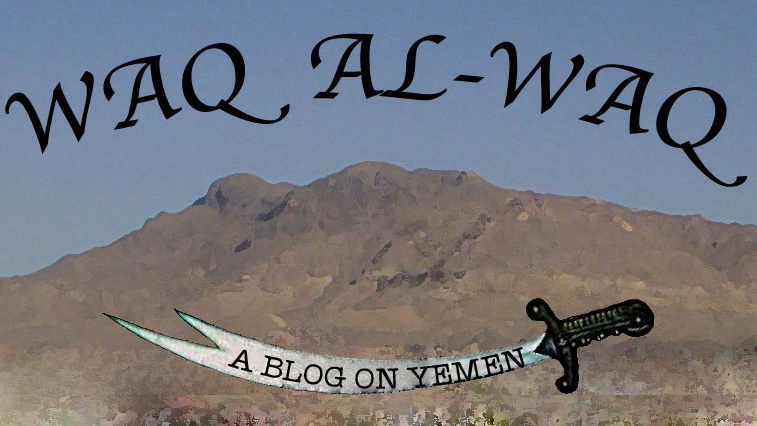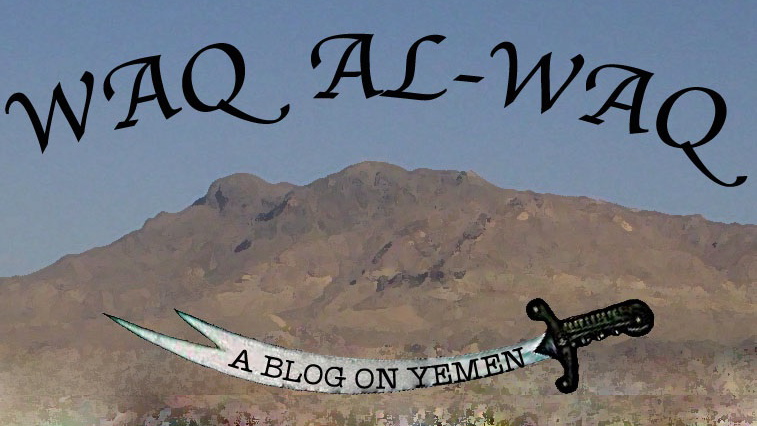Tuesday Papers: or tribal politics in Marib
There has been much in the way of news since our last blog post a few days ago, but in Waq al-waq’s typical shotgun approach we will only discuss what is interesting to us and what we have time to talk about before we, you know, get back to paying work.
Some of the highlights that we are skipping because we aren’t a scandal rag or gossip mongers is the news coming out of Her Majesty’s new embassy across from the Movenpick. Tsk, tsk lads.
Instead we turn, or perhaps more accurately, return to the growing dispute between Shaykh Muhammad al-Ti’ayman and the Ministry of the Interior. I talked a bit about this last week, but it seems as though the mediation attempt by the governor of Marib, Naji al-Zaaydi failed. So, once again, the Jahm tribe has taken to blocking the Marib to San’a road and refusing to allow oil tankers through.
I like the article for two reasons. First, because it features a great quote from Shaykh al-Ti’ayman, whom Marib Press spoke to on the phone: “The solution to the problem is very easy.” (I just love the understatement and attitude of innocence in the statement – it is great on so many levels). Second is the tribal politics.
The Jahm tribe as some of you may know is part of the Bani Jabr, which is itself part of the Upper Khawlan. But Jahm is divided into six sub-clans. Both Shaykh al-Ti’ayman and Governor Zaaydi are from Jahm, but they are from different clans. Shaykh al-Ti’ayman is from Al Qa’shl bin Fihayd while the governor is from Al Muhammad bin Falah.
My understanding is that the governor was selected as a mediator more for his tribal identity than for his position with the government, but the fact that he could not get the Ministry of the Interior to deal shows some of the weakness of his government identity. I mention all of this – well in addition to it being fun – to illustrate just how complicated the politics and tribes are in Yemen. I was involved in a long discussion about this yesterday and was frustrated with the idea that one could speak of tribes as a monolithic bloc or even as actors in the two main confederations. I don’t think this is possible.
That wasn’t, however, the only mediation in town. Shaykh ‘Abd al-Jalil Sinan was part of the mediation committee that freed the kidnapped Japanese citizen. The kidnapping was carried out by the Arhab tribe from San’a in order to put pressure on the government to release a man that News Yemen is identifying as Husayn ‘Abdullah Husayn Jawb. But instead of talking about the mediation and tribal politics in this case I would like to say something about jihad abroad and jihad at home.
The News Yemen piece I linked to above claims that Jawb spent two years fighting in Iraq and then spent a year in Syria and a year in Lebanon. It also claims that he was arrested for being a member of al-Qaeda. But this is where it gets tricky. Fighting against US forces in Iraq or Afghanistan is something that has, in my opinion, fairly widespread support in Yemen. (This is why al-Hitar could not make it part of his dialogue sessions from 2002-2005.) But this also raises problems for the Yemeni government.
It can attempt to arrest all of these individuals that fought and throw them in jail, which are, by the way, radicalization factories. This pleases the US, but angers a fairly large portion of its domestic constituents and has repercussions as the kidnapping of the Japanese citizen indicates. Or the government can let these individuals go free in Yemen but then it does run the risk of having them join al-Qaeda if they were radicalized by their time in Iraq or Afghanistan and of course this angers the US.
It takes, as I have said before, a fairly large political and theological leap to move from fighting in Iraq or Afghanistan to fighting in Yemen. This is, of course, something that some individuals have proven capable of doing but not, I would argue, the majority of Yemenis who have fought in either conflict.
I say this not to offer any sort of prescription – those cost money – but rather to lay out some of the dilemmas in Yemen and to illustrate how different the view of the war against al-Qaeda is in a place like San’a as compared to Washington. What is black-and-white in the US veers into various shades of gray in Yemen.
Having already blogged for more time than my schedule allows today I will end here with a couple of comments. First, thanks to all the readers who have left comments over the past several days, my apologies for not answering them all individually. I will say to the one individual that asked about translations of News Yemen, unfortunately my time does not permit me to spend the time translating individual articles. (I had a conversation with an MA student here not long ago about translation and the difficulties inherent in it – it takes much more time than just reading the article in one language and then reproducing it in another, or at least it does for me.)
I will try to speak to the Small Wars Journal soon and the idiotic idea that Saudis involvement in the Huthi conflict is good for the US – but despite appearances, we try to limit our attacks and keep our sharps knives sheathed most of the time. Others, well, I’m afraid I can’t remember any other comments at the moment, so …. sorry.
It was nice to meet more of Waq al-waq’s readers over the past few days. You are all as nice in person as I always imagined you to be.




